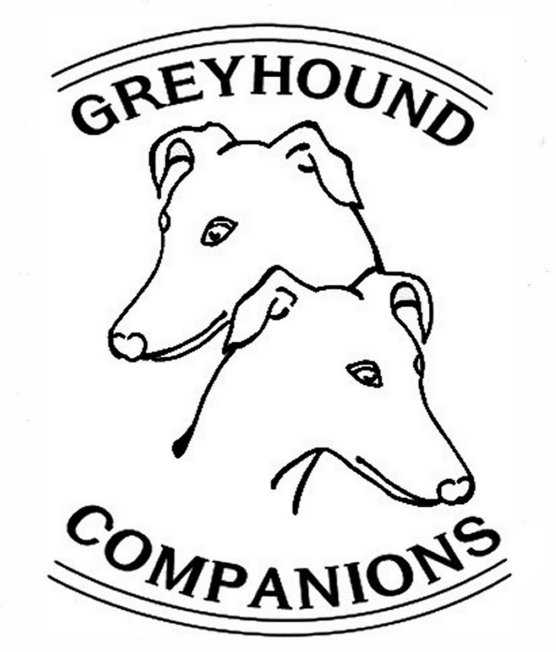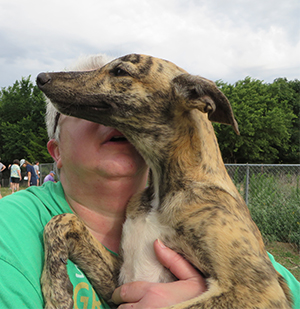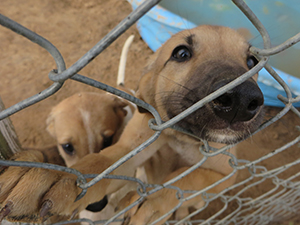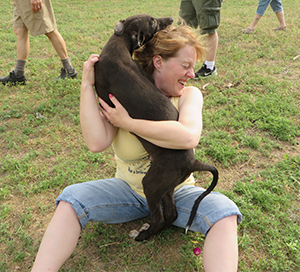Important Information For New Adopters (And Experienced Adopters too!)
The foods we suggest are Natural Balance, Nutro, Halo. Basically any high-end dog food sold at Petco, Petsmart or Chewy.com. We recommend 2 cups of food in the morning and 2 cups at night mixed with 1 cup warm water (heated in the microwave, not straight from the tap). Some of us add hamburger or chicken. You can also add a plop of yogurt or cottage cheese.
We recommend giving glucosamine to greyhounds older than 5 years. A great source for powder glucosamine is GreyhoundGang.com. They sell pure powder glucosamine at a very reasonable price. It can be added to their breakfast or dinner. Dosage is ½ teaspoon.
Loop your hand through the leash loop to secure the leash. Remember, ALWAYS have your greyhound on a leash when outside a fenced area. Greyhounds are sprinters, not long distance runners, therefore are not necessarily appropriate jogging partners.
It is very important to mark low windows,
glass doors and screen doors with post-its. Greyhounds have never seen glass windows
or screen doors and they might try to go
right through them.
Greyhounds will literally “melt” in the shower or bathtub
when getting a bath. Don't worry, its normal. Most of us
only give our greys a bath once or twice a year. You can do this outside, but only use warm water, not straight from the hose and make sure it is warm enough outside. If using a
flea shampoo, make sure it's safe for puppies and kittens.
Greyhounds are sensitive to temperature. They are house dogs and MUST NOT be left outside for long periods of time (i.e. hours or all day/night). Greyhounds cannot be tied up outside. Because of their great speed, they could take off and snap their necks. They overheat in the summer if left outside
too long. Most greys only need coats when it’s below 30°. Just to go outside to go potty they shouldn’t ever need a coat, even in very cold temperatures.
Stay away from any food or treats with red dye.
Make sure to give your greyhound their heartworm pill EVERY month, all year round.
Greyhounds tend to drip from their noses when nervous or excited. This is normal. Greyhounds do a lot of bowing and stretching.
Best Friends Animal Hospital
202 Frank Scott Parkway East
Swansea, IL 62226618-222-9860
Tesson Ferry Veterinary Hospital12960 Tesson Ferry RoadSt. Louis, MO 63128314-842-3377
Heritage Veterinary Hospital / Dr. Kim Sanford
12952 Olive Blvd.
Creve Coeur, MO 63141
314-878-8454
Greyhound Companions of Missouri
"What A Difference A Grey Makes"
Barrett Station Veterinary Clinic
2208 Mason Lane
Manchester, MO 63021
314-822-2882
County Animal Hospital
14020 Manchester Road
Manchester, MO 63011
636-256-8387
Howdershell Animal Clinic
440 Howdershell
Florissant, MO 63031
314-838-3575
Listed below are vets we recommend, because they are very familiar with greyhounds who are sensitive to certain medicines, chemicals and anesthesia.
If your Grey needs surgery for whatever reason (i.e., tumor removal, amputation), we want to strongly urge you to read this article, do some research on your own and talk to your vet. There has been an increasing number of greys losing their lives due to post-surgical bleeding. There is ongoing research into thIs problem in Greyhounds [C. Guillermo Couto, DVM at the Ohio State University College of Veterinary Medicine (https://greyhound.osu.edu/) has done extensive research on the topic] and all seem to agree that a post-surgical treatment of Amicar (or tranexamic acid, a readily available and inexpensive drug) can help prevent death in these situations. Even if your vet has done blood work prior to the surgery and everything seems normal, there can still be unexpected post-surgical bleeding complications that almost always leads to death. http://vetmedicine.about.com/od/dogdiseasesconditions/a/GHWP-Interview.htm




